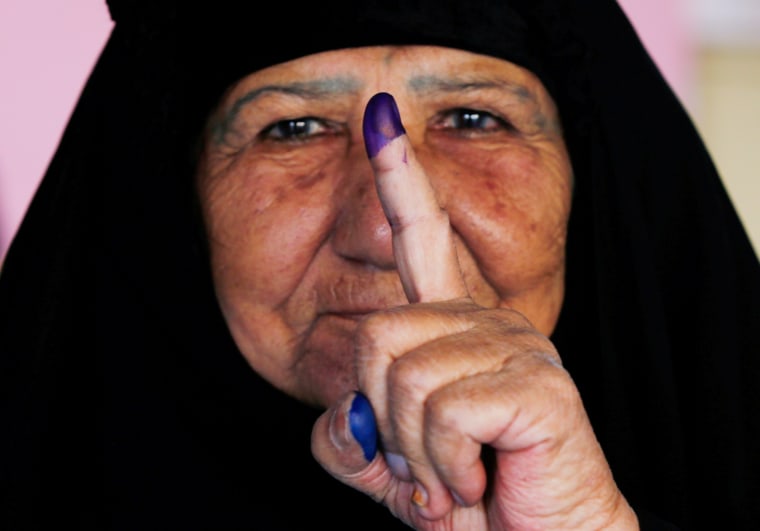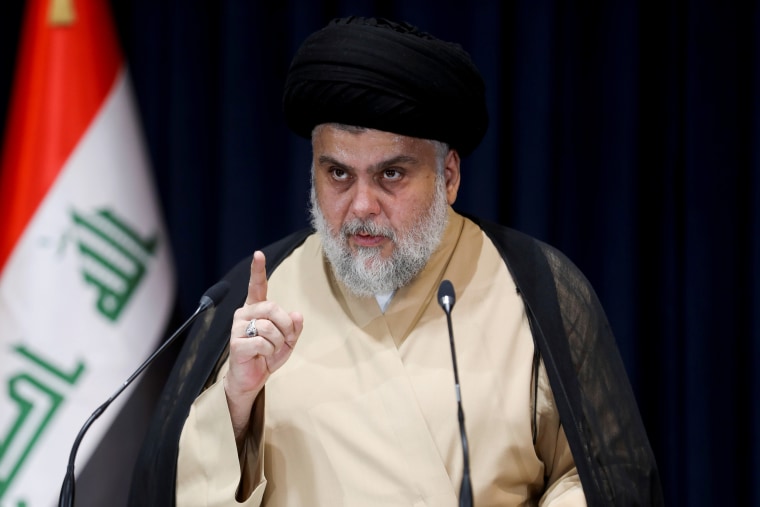An alliance of Iraqi candidates representing Shiite militias supported by neighboring Iran has emerged as the biggest loser in the country’s national elections held over the weekend, according to partial results released Monday.
The results, posted online successively, also showed the bloc of Iraq’s populist Shiite cleric Muqtada al-Sadr maintaining the most seats in parliament, leading in several of Iraq’s 18 provinces, including the capital Baghdad. Al-Sadr, a maverick leader remembered for leading an insurgency against U.S. forces after the 2003 invasion, appeared to have increased his movement’s seats in the 329-member parliament from 54 in 2018 to more than 70.
With 94 percent of the ballot boxes counted, none of the competing political blocs appeared on track to win a majority in parliament and consequently name a prime minister. But as the results stand, al-Sadr’s bloc will be able to take a leading role in the political horse-trading to find a compromise candidate and set the political agenda for the next four years.
Iraq’s Shiite groups have dominated governments and government formation since the U.S.-led invasion of 2003 that toppled Sunni dictator Saddam Hussein and catapulted the Shiite majority and the Kurds to power.
Sunday’s election was held several months early, in response to mass protests in 2019 that toppled a government and showed widespread anger against political leaders whom many Iraqis say have enriched themselves at the expense of the country.
But a record low turnout suggested that a vote billed as a chance to wrest control from the ruling elite would do little to dislodge sectarian religious parties in power since 2003.
Al-Sadr’s group is just one of several that will have to enter negotiations to form a coalition capable of dominating parliament and forming an administration, a period of jockeying for position that may take weeks or longer.
Al-Sadr broadcast a live speech on state TV claiming victory and promising a nationalist government free of foreign interference.
“We welcome all embassies that do not interfere in Iraq’s internal affairs,” he said, adding that celebrations would take place in the streets “without weapons."
The unpredictable populist cleric has been a dominant figure and often kingmaker in Iraqi politics since the U.S. invasion.
He opposes all foreign interference in Iraq, whether by the United States, against which he fought an insurgency after 2003, or by neighboring Iran, which he has criticized for its close involvement in Iraqi politics.

Al-Sadr, however, is regularly in Iran, according to officials close to him, and has called for the withdrawal of U.S. troops from Iraq, where Washington maintains a force of around 2,500 in a continuing fight against Islamic State.
The initial results also showed that pro-reform candidates who emerged from the 2019 protests had gained several seats in the 329-member parliament.
Iran-backed parties with links to militia groups accused of killing some of the nearly 600 people who died in the protests took a blow, winning less seats than in the last election in 2018, according to the initial results and local officials.
Kurdish parties won 61 seats, the results showed, including 32 for the Kurdistan Democratic Party which dominates the government of the autonomous Kurdish region of Iraq, and 15 for its rival the Patriotic Union of Kurdistan party.
Sunni parliament speaker Mohammed al-Halbousi’s Taqaddum coalition won 38 seats, Iraq’s state news agency reported, making it the second largest in parliament. Maliki’s State Of Law coalition came third overall with 37.
Elections in Iraq since 2003 have been followed by protracted negotiations that can last months and serve to distribute government posts among the dominant parties.
